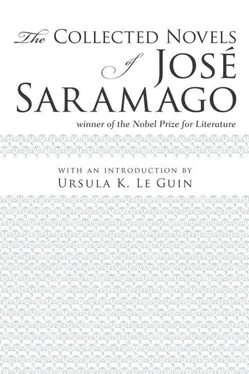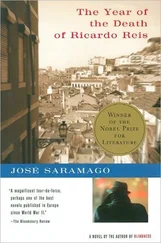For some Lent is a dream, for others a vigil. The Easter festivities passed and wives returned to the gloom of their apartments and their cumbersome petticoats, at home there are a few more cuckolds, who can be quite violent when infidelities are practised out of season. And since we are now on the subject of birds, it is time to listen in church to the canaries singing rapturously of love from their cages decorated with ribbons and flowers, while the friars preaching in the pulpits presume to speak of holier things. It is Ascension Thursday, and the singing of the birds soars to the vaults of heaven regardless of whether our prayers follow, without their assistance, our prayers have little hope of reaching God, so perhaps we shall all remain silent.
THIS SCRUFFY-LOOKING FELLOW with his rattling sword and ill-assorted clothes, even though barefoot, has the air of a soldier, and his name is Baltasar Mateus, otherwise known as Sete-Sóis or Seven Suns. He was dismissed from the army where he was of no further use once his left hand was amputated at the wrist after being shattered by gunfire at Jerez de los Caballeros, in the ambitious campaign we fought last October with eleven thousand men, only to end with the loss of two hundred of our soldiers and the rout of the survivors, who were pursued by the Spanish cavalry dispatched from Badajoz. We withdrew to Olivença with the booty we had taken in Barcarrota, feeling much too down-hearted to enjoy it, gaining little by the ten leagues march there, and then making a rapid retreat over the same distance, only to leave behind on the battlefield so many casualties and the shattered hand of Baltasar Sete-Sóis. By great good fortune, or by the special grace of the scapular he was wearing around his neck, his wound did not become gangrenous, nor did they burst his veins with the force of the tourniquet applied to stop the bleeding, and thanks to the surgeon’s skill, it was only a matter of disarticulating the man’s tendons, without having to cut through the bone with a handsaw. The stump was treated with medicinal herbs, and Sete-Sóis had such healthy flesh that after two months the wound was completely healed.
Having saved little or nothing of his soldier’s pay, Sete-Sóis begged for alms in Évora till he had enough money to pay the blacksmith and the saddler for an iron hook to replace his hand. This was how he spent the winter, putting aside half of the money he managed to collect, reserving half of the other half for the journey ahead, and spending the rest on food and wine. It was already spring by the time he had paid off the final instalment he owed the saddler and collected the iron hook, as well as a spike he had ordered, because Baltasar Sete-Sóis fancied the idea of having an alternative left hand. Crafted leather fittings were skilfully attached to the tempered irons, and there were two straps of different lengths to attach the implements to the elbow and shoulder for greater support. Sete-Sóis began his journey when it was rumoured that the garrison at Beira was to remain there instead of coming to the assistance of the troops in Alentejo, where there was an even greater shortage of food than in the other provinces. The army was in tatters, barefoot and reduced to rags, the soldiers pilfered from the farmers and refused to go on fighting, a considerable number went over to the enemy, while many others deserted, travelling off the beaten track, looting in order to eat, raping any women they encountered on the way, in short, taking their revenge on innocent people who owed them nothing and shared their despair. Sete-Sóis, maimed and bedraggled, travelled the main highway to Lisbon, deprived of his left hand, part of which had remained in Spain and part in Portugal, and all because of a strategic war to decide who was to occupy the Spanish throne, an Austrian Charles or a French Philip, but no one Portuguese, whether unimpaired or one-handed, intact or mutilated, unless to leave severed limbs or lost lives behind on the battlefield is not only the destiny of soldiers who have nothing but the ground to sit on. Sete-Sóis left Évora and passed through Montemor, accompanied by neither friar nor demon, for when it came to extending a begging hand, the one he possessed was sufficient.
Sete-Sóis went at his leisure. There was no one waiting to greet him in Lisbon, and in Mafra, which he had left many years ago to join His Majesty’s Infantry, his father and mother, if they remember him, will think he is alive since no one has reported him dead or believe him to be dead because they have no proof he is still alive. All will be revealed in good time. The sun shines brightly and there has been no rain, the countryside is covered with flowers and the birds are singing. Sete-Sóis carries his irons in his knapsack, for there are moments, sometimes whole hours, when he imagines he can feel his hand, as if it were still there at the end of his arm, and it gives him enormous pleasure to imagine himself whole and entire just as Charles and Philip will sit whole and entire on their thrones, for thrones they will certainly have when the war is over. Sete-Sóis is content, so long as he does not look to find that his hand is missing, to feel an itching at the tip of his index finger and imagine that he is scratching the spot with his thumb. And when he starts to dream tonight, if he catches a glimpse of himself in his sleep he will see that he has no limbs missing, and will be able to rest his tired head on the palms of both hands.
Baltasar keeps the irons in his knapsack for another good reason. He very quickly discovered that whenever he wears them, especially the spike, people refuse him alms, or give him very little, although they always feel obliged to give him a few coins because of the sword he carries on his hip, despite the fact that everyone carries a sword, even the black slaves, but not with the gallant air of a professional soldier, who might wield it this very moment, if provoked. And unless the number of travellers outweighs the fear provoked by the presence of this brigand, who stands in the middle of the road, barring their passage and begging alms, alms for a poor soldier who has lost his hand and who but for a miracle might have lost his life, for the solitary traveller does not want this plea to turn to aggression, coins soon fall into the outstretched hand, and Baltasar is grateful that his right hand has been spared.
After passing through Pegões, at the edge of the vast pine forests, where the soil becomes arid, Baltasar, using his teeth, attached the spike to his stump, also useful as a dagger if necessary, for this was a time when deadly weapons such as daggers were forbidden, but Sete-Sóis enjoyed what might be termed immunity, so, doubly armed with spike and sword, he set off amid the shadows of the trees. A little farther on he would kill one of two men who tried to rob him, even though he told them that he was carrying no money, but after a war in which so many have lost their lives, this encounter need not concern us, except to note that Sete-Sóis then substituted the hook for the spike so he could drag the corpse off the path, making good use of both implements. The robber who escaped stalked him for another half-league through the pine groves, but finally gave up the chase, continuing to curse and insult him from a distance but with no real conviction this would have much effect.
When Sete-Sóis reached Aldegalega, it was already growing dark. He ate some fried sardines and drank a bowl of wine, and with barely enough money left for the next stage of his journey, let alone for lodgings at an inn, he sheltered in a barn, underneath some carts, and there he slept wrapped in his cloak, but with his left arm and the spike exposed. He spent the night peacefully. He dreamt of the battle at Jerez de los Caballeros and knew that this time the Portuguese would be victorious under the leadership of Baltasar Sete-Sóis, who carried his severed left hand in his right hand, a prodigious talisman against which the Spaniards could not defend themselves with either shield or exorcism. When he opened his eyes, the first light of dawn had still not appeared on the eastern horizon, he felt a sharp pain in his left arm, which was not surprising, since the spike was pressing on the stump. He untied the straps and, using his imagination, all the more vivid at night, and especially in the pitch-black darkness under the carts, Baltasar convinced himself he still had two hands even if he could not see them. Both of them. He tucked his knapsack under his left arm, curled up under his cloak, and went back to sleep. At least he had managed to survive the war. He might have a limb missing, but he was still alive.
Читать дальше












